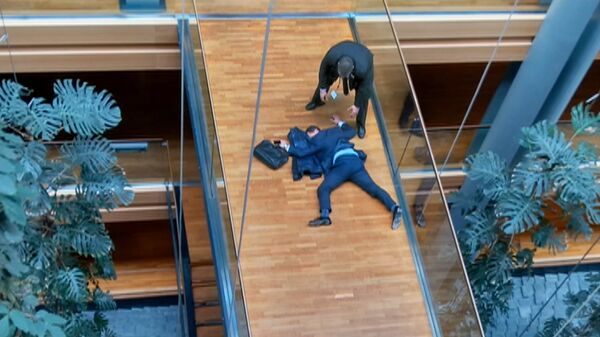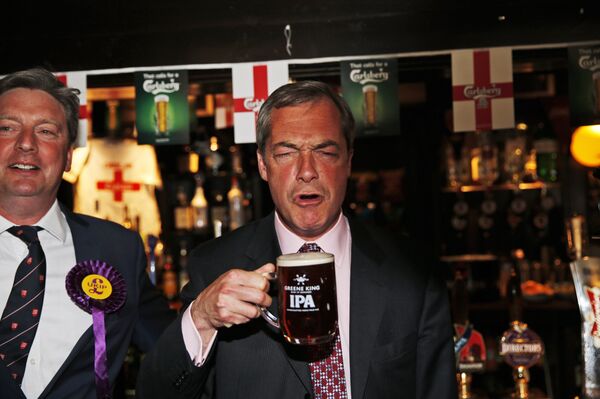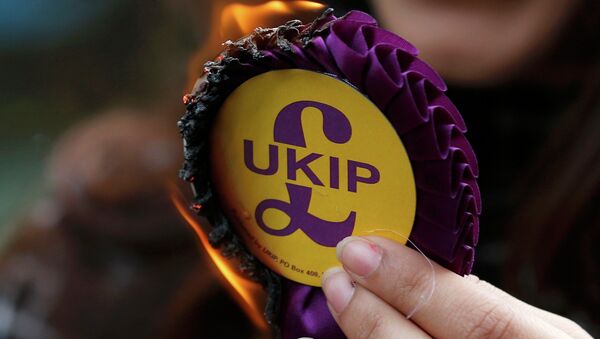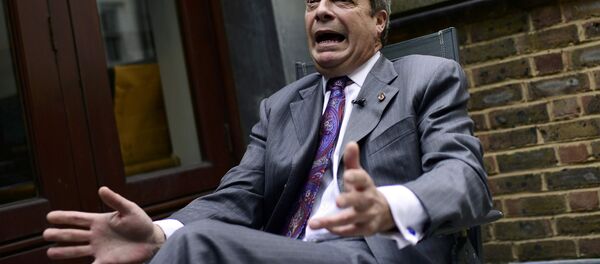The problem is that the party — having effectively won its way, with Britain voting to leave the EU at a referendum on June 23 — has lost its sense of purpose. The latest row to split the party involves a leadership contender hospitalized by another UKIP member who has now quit the party completely.
A meeting of UKIP MEPs in the Strasbourg parliament building, early October, got out of control when Steven Woolfe — who was a favorite to take over as party leader — was accused of considering defecting to the Conservative Party. An exchange took place between him and fellow MEP Mike Hookem, which left Woolfe unconscious and needing treatment from paramedics.

Woolfe's condition was originally described as "life threatening" with possible "blood on the brain," but a series of scans proved that he had made a recovery from hi injuries. Hookem denies punching Woolfe. But now, Woolfe has resigned from the party saying UKIP is in a "death spiral."
One needs to look back to the halcyon days before the election of 2010, when Nigel Farage — the media friendly, beer-swilling, cricket-loving, Brussels bete noire, car — and aircrash survivor, who is married to a German national — was leader of the party (2006-2009, then 2010 onwards). He was the amiable face of the "Quit Europe" brigade and enjoyed growing popularity — particularly among many Conservative grassroots voters.

Farage ramped up the pressure for Britain to leave the EU and saw his party membership rocket. When David Cameron came to power in 2010 — in coalition with the Liberal Democrats — he faced growing pressure from within his party over the EU.
Out of Control
In an effort to assuage euroskeptics in his Conservative Party, ahead of the 2015 election, Cameron was forced to promise an In-Out referendum. He won the election — albeit with a small majority — due largely to the referendum promise.
When the shock verdict of the British people came in — 52 percent Out and 48 percent Remain — Cameron was forced to resign as prime minister. Meanwhile, Farage — having failed to win a seat in Westminster — stood down as leader of UKIP.
Three days later, Farage was back in charge of the party after being persuaded to withdraw his resignation. He resigned again on July 4, 2016, triggering the leadership election. That was won on September 16 by Diana James who promptly realized the sheer scale of the problems she faced in the party and promptly resigned 18 days later.
Always interesting to see #UKIP financer Arron Banks confirm that the #brexit campaign was based on avoiding facts: pic.twitter.com/FoAUei1F9z
— Richard Corbett (@RCorbettMEP) 18 October 2016
Woolfe had said he would stand as leader in the subsequent (and current) election, but has now walked away from the party altogether, leaving a reluctant Farage in temporary charge of a party that has lost its way amid continuing internal battles over what the party is even for, now Britain is set to leave the EU (though nobody knows quite what that means yet).
UKIP's only MP in Westminster, Douglas Carswell, has stated he has never wanted to be party leader and has clashed with Farage on many occasions. David Coburn, the Scottish UKIP leader has thrown his hat into the ring, suggesting he could be persuaded to run for the leadership, although that would be a rather bizarre situation, as Scottish voters in the referendum elected to remain in the EU and it would be a difficult jump to take credibly.
A Scottish UKIP member, heading an anti-EU party that succeeded in winning a Brexit, leading a party debating Brexit negotiations against Scottish First Minister Nicola Sturgeon, who has promised another Scottish independence referendum and calling for a "special relationship" within the EU is stretching credibility.
Meanwhile, Woolfe — now out of hospital and recovered after his fracas in Strasbourg — has now quit the party, leaving it with a reluctant temporary leader, a single MP who wants very little to do with the leadership and a party of supporters punch drunk after forcing Brexit, but with nobody knowing what to do now.




